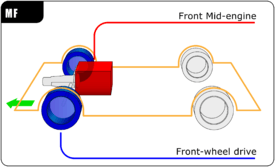Front mid-engine, front-wheel-drive layout
In automotive design, a Front Mid-engine, Front-wheel-drive layout (sometimes called FMF or just MF) is one in which the front road wheels are driven by an internal-combustion engine placed just behind them, in front of the passenger compartment. In contrast to the Front-engine, front-wheel-drive layout (FF), the center of mass of the engine is behind the front axle. This layout is typically chosen for its better weight distribution (the heaviest component is near the center of the car, lowering its moment of inertia). Since the differences between the FF and MF layouts are minor, most people consider the MF layout to be the same as the FF layout.

However, the mid-engined layout uses up central space, making the resulting vehicle rather long. This may be why no manufacturer currently offers the MF layout.
Examples of road cars using the MF layout include the Acura Vigor, Cord 810, BSA Scout, Citroën Traction Avant, Citroën DS, Renault 4 (and derivatives R5 and R6), Renault 16, Saab 900 Saab Sonett mk1, and the Citroën SM, also some commercial vehicles like the Tempo Matador. These vehicles have longitudinal mounted engines; transverse engined vehicles are possible in theory if the issue of passenger footwell location is addressed. The Toyota iQ comes close to this by having its front differential in front of the engine,[1] however despite this, the iQ is still considered to have an FF layout.
Traditionally, the term mid-engine has been reserved for cars that place the engine and transaxle behind the driver and in front of the rear axles , as in the Lamborghini Countach or Ferrari Testarossa, but an engine placed in front of the driver's compartment but fully behind the front axle line also qualifies as mid-engine.
Gallery
 Citroën Traction Avant revolutionized auto design with its low slung unibody design bodywork.
Citroën Traction Avant revolutionized auto design with its low slung unibody design bodywork. Saab Sonett mk1 used the MF layout by turning the engine and running it "backwards".
Saab Sonett mk1 used the MF layout by turning the engine and running it "backwards". The Renault 5 was one of the last successful mid-engine, front-wheel-drive layouts.
The Renault 5 was one of the last successful mid-engine, front-wheel-drive layouts..jpg) The Nissan GT-R LM Nismo was the only Le Mans Prototype race car with a mid-engine, front-wheel-drive layout.
The Nissan GT-R LM Nismo was the only Le Mans Prototype race car with a mid-engine, front-wheel-drive layout.